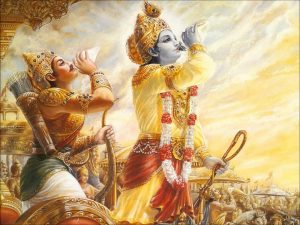 Meaning of Karma Yoga
Meaning of Karma Yoga
The world karma (or karma), derived from the root Kr (‘to do’), has many meanings; it signifies ‘action. Work, deed, product, effect’, and so on. The term karma–yoga is best translated with ‘yoga of unselfish and correct) action’. The starting point of this yoga is the ascertainment of the fact that life is action. Inactivity can only be a denial of life itself. Hence it cannot be a remedy to the human situation. What is required s a properly channeled activity. It is an axiom of Karma yoga that the wholesome transcendental realization is not only to be gained by a meditative withdrawal from the world, but also by an active participation in life. Both approaches are recommended in the Bhagavad-Gītā, karma yoga is extolled as superior to mere renunciation (samnyāsa). The fundamental principles of Karma yoga are aptly expressed in these verses from the Bhagavad-Gītā:
Action and mental attitude
Not by abstention from actions does a man enjoy actionlessnes (naiskarmya), nor by renunciation alone does he approach perfection.
For, not even for a moment can anyone ever remain without performing action. Every (being) is unwittingly made to act by the primary – constituents (guna) born of the world ground.
This word is action – bound, save when this (is intended) as sacrifice. With that purpose (in mind), o son – of – kunti, engage in action devoid of attachment. Therefore always perform unattached the right deed, for the man who performs action without attachment obtains the supreme.
Through karma yoga every action is turned into a sacrifice and hence does not defile the individual. Only selfish actions, born of ignorance, have the power to bind man to the cycle of repeated births and deaths. The ideal of Karma yoga is actionlessness in action or naiskarmya – karma.
Vāsistha of Vālmīki
Another important scripture expounding this yoga is the yoga – Vāsistha of Vālmīki. It favours an even more positive affirmation of mundane existence than the Bhagavad-Gītā. The yogin is invited to fully participate in the activities of his family and society. Jnana and karma are compared to the two wings of a bird. Emancipation is achieved by a harmonious development of means, knowledge and action.
